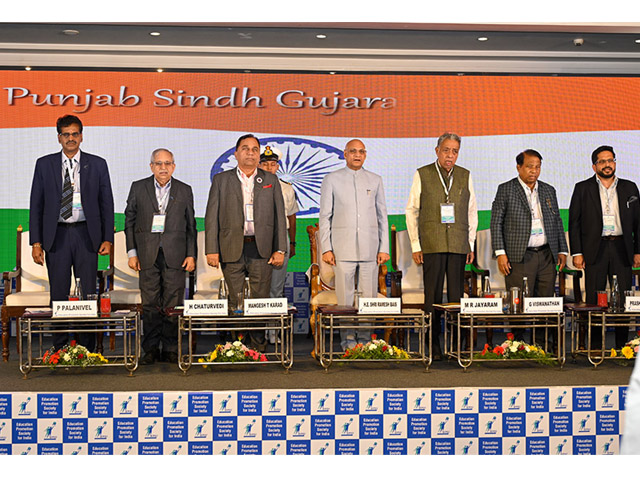National Conference on “India@2047: Role of Higher Education in Making India a Developed Nation” was held on Monday, 4th March 2024, in Pune.

Pune, India – The Education Promotion Society for India (EPSI) was proud to announce the National Conference on “India@2047: Role of Higher Education in Making India a Developed Nation” held on Monday, the 4th of March 2024, at the Majestic Hall, Hotel Sheraton Grand, Pune.
The conference aimed to explore the pivotal role of higher education in shaping India’s journey towards becoming a developed nation by 2047, the centenary year of India’s independence. The event featured esteemed speakers and thought leaders from the field of education, government, and industry.
Hon’ble Governor Shri Ramesh Bais, in his Valedictory address, commended the conference organizers for fostering a platform that facilitated constructive dialogue and the exchange of ideas. He emphasized the importance of collaborative efforts in addressing the challenges and opportunities faced in the present era. “I am delighted to witness the enthusiasm and dedication displayed by the participants of this conference,” said Governor Bais. “Events like these serve as catalysts for innovation and progress, fostering an environment conducive to the development of our nation.”
Dr. H Chaturvedi, Alternate President of EPSI and Chief Educational Advisor at Birla Academy of Arts & Culture, Kolkata, highlighted the significance of the conference theme and the role of higher education in India’s development journey. He also touched on the current challenges and opportunities in the education sector, emphasizing the need for collaboration and innovation.
Prof. (Dr.) Mangesh T Karad, Senior Vice President of the Education Promotion Society for India (EPSI) and Executive President of MIT ADT University, Pune, explored the various aspects of higher education that are crucial for India’s development aspirations. He discussed the importance of quality education, research, innovation, and global collaboration in shaping India’s future as a developed nation.
Dr. Prashant Bhalla, Senior Vice President of EPSI and President of Manav Rachna Educational Institutions, Faridabad, delivered a Special Address at the National Conference. In his Special Address, he shared his insights and perspectives on the role of higher education in India’s journey towards becoming a developed nation by 2047. Dr. Bhalla is known for his innovative approach to education.
Dr. Viswanathan is a visionary leader in the field of education, known for his pioneering efforts in establishing Vellore Institute of Technology as a premier educational institution in India. As the Chief Patron of EPSI, he has been instrumental in advocating for the interests of educational institutions in India. Dr. Viswanathan highlighted the challenges and opportunities facing the education sector in India and offered his vision for the future of higher education in the country.
Dr. Jayaram is a distinguished figure in the field of education, renowned for his leadership and contributions to the advancement of higher education in India. As the President of EPSI, he has been at the forefront of efforts to promote excellence and innovation in education across the country. In his Presidential Address, Dr. Jayaram shared his insights and perspectives on the conference theme and the critical role of higher education institutions in India’s development journey. He highlighted the achievements and initiatives of EPSI in driving positive change in the education sector.
Dr. Abhay Jere, Vice Chairman of the All India Council for Technical Education (AICTE), New Delhi, addressed the audience as the Guest of Honor at the National Conference. Dr. Jere is known for his strategic vision and initiatives to enhance the quality of technical education in India. As the Vice Chairman of AICTE, he plays a crucial role in shaping policies and standards for technical education institutions across the country. Dr. Jere shared the initiatives and reforms undertaken by AICTE to promote excellence and innovation in technical education.
In his Words of Thanks, Mr. Palanivel expressed gratitude to all the participants, speakers, sponsors, and organizers for their contributions to the success of the conference. He also reflected on the key highlights and insights shared during the conference and emphasized the importance of collaboration and innovation in higher education.
At the National Conference, two panel discussions emerged as pivotal focal points, shedding light on crucial aspects pertinent to the advancement of education in India. Titled “Two-Way Internationalization for Making India A Hub for Higher Education” and “Creating A Quality Ecosystem Through Capacity Building for Accreditation and Ranking,” these discussions underscored the significance of collaborative efforts and capacity building in shaping the educational landscape of the nation.
The first panel discussion, “Two-Way Internationalization for Making India A Hub for Higher Education,” delved into the importance of fostering partnerships and collaborations with international institutions to position India as a global hub for higher education. Panelists emphasized the need for bilateral exchanges, joint research initiatives, and curriculum development to enhance the quality and relevance of education offered in India.
Simultaneously, the discussion on “Creating A Quality Ecosystem Through Capacity Building for Accreditation and Ranking” highlighted the crucial role of accreditation and ranking systems in ensuring quality assurance and continuous improvement in the education sector. Panelists deliberated on strategies to strengthen the accreditation process, enhance institutional capacity, and promote transparency and accountability in educational practices.
Both panel discussions garnered significant attention and participation from delegates, reflecting the collective commitment towards advancing the educational ecosystem in India. Participants engaged in thought-provoking conversations, sharing insights, best practices, and innovative approaches to address the challenges and opportunities in higher education.
The discussions underscored the importance of adopting a holistic approach towards internationalization and capacity building, emphasizing the need for collaboration, innovation, and strategic planning to propel India towards becoming a global leader in education.
